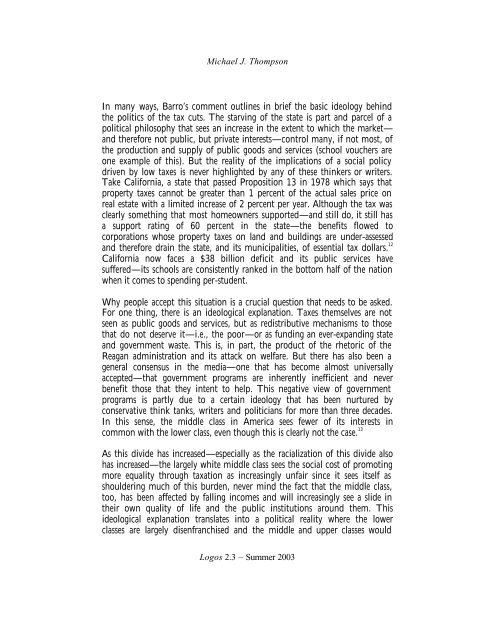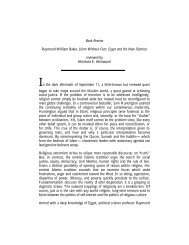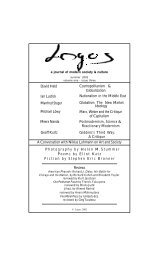Michael J. Thompson Stephen Eric Bronner Wadood Hamad - Logos
Michael J. Thompson Stephen Eric Bronner Wadood Hamad - Logos
Michael J. Thompson Stephen Eric Bronner Wadood Hamad - Logos
Create successful ePaper yourself
Turn your PDF publications into a flip-book with our unique Google optimized e-Paper software.
<strong>Michael</strong> J. <strong>Thompson</strong><br />
In many ways, Barro’s comment outlines in brief the basic ideology behind<br />
the politics of the tax cuts. The starving of the state is part and parcel of a<br />
political philosophy that sees an increase in the extent to which the market—<br />
and therefore not public, but private interests—control many, if not most, of<br />
the production and supply of public goods and services (school vouchers are<br />
one example of this). But the reality of the implications of a social policy<br />
driven by low taxes is never highlighted by any of these thinkers or writers.<br />
Take California, a state that passed Proposition 13 in 1978 which says that<br />
property taxes cannot be greater than 1 percent of the actual sales price on<br />
real estate with a limited increase of 2 percent per year. Although the tax was<br />
clearly something that most homeowners supported—and still do, it still has<br />
a support rating of 60 percent in the state—the benefits flowed to<br />
corporations whose property taxes on land and buildings are under-assessed<br />
and therefore drain the state, and its municipalities, of essential tax dollars. 12<br />
California now faces a $38 billion deficit and its public services have<br />
suffered—its schools are consistently ranked in the bottom half of the nation<br />
when it comes to spending per-student.<br />
Why people accept this situation is a crucial question that needs to be asked.<br />
For one thing, there is an ideological explanation. Taxes themselves are not<br />
seen as public goods and services, but as redistributive mechanisms to those<br />
that do not deserve it—i.e., the poor—or as funding an ever-expanding state<br />
and government waste. This is, in part, the product of the rhetoric of the<br />
Reagan administration and its attack on welfare. But there has also been a<br />
general consensus in the media—one that has become almost universally<br />
accepted—that government programs are inherently inefficient and never<br />
benefit those that they intent to help. This negative view of government<br />
programs is partly due to a certain ideology that has been nurtured by<br />
conservative think tanks, writers and politicians for more than three decades.<br />
In this sense, the middle class in America sees fewer of its interests in<br />
common with the lower class, even though this is clearly not the case. 13<br />
As this divide has increased—especially as the racialization of this divide also<br />
has increased—the largely white middle class sees the social cost of promoting<br />
more equality through taxation as increasingly unfair since it sees itself as<br />
shouldering much of this burden, never mind the fact that the middle class,<br />
too, has been affected by falling incomes and will increasingly see a slide in<br />
their own quality of life and the public institutions around them. This<br />
ideological explanation translates into a political reality where the lower<br />
classes are largely disenfranchised and the middle and upper classes would<br />
<strong>Logos</strong> 2.3 – Summer 2003




